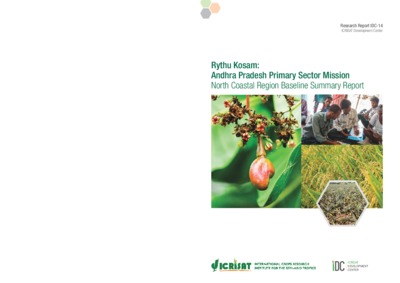Rythu Kosam: Andhra Pradesh Primary Sector Mission. North Coastal Region Baseline Summary Report. Research Report IDC-14
Abstract
Andhra Pradesh state has set for itself a target of becoming one of the top three states in India by 2022, in terms of socio-economic development and ease of doing business. The state aspires to achieve the status of a developed state in the country by 2029, and the vision is to lay the foundation for the ‘Sunrise state of Andhra Pradesh’. However, achievement of this vision is incumbent upon fast-paced and sustainable double-digit growth, delivered through a combination of programmatic and project interventions with focus on sustainable and inclusive development. To achieve its vision, the government has charted out a multi-pronged strategy comprising seven Missions, five Grids and five Campaigns. Among the seven, Primary Sector Mission (Rythu Kosam Mission) is at the top – with the aim of achieving the double digit growth in agriculture and allied sectors. The massive outlay of investments over the next five-year period (2015-2020) is targeted at agricultural development through a consortium approach that brings together state, national and international partners. In partnership with the government of Andhra Pradesh, ICRISAT leads the consortium and has designed a strategy to transform agriculture and allied sectors in the state. The prime focus of this mission is on improving soil fertility, providing access to better seed, reducing the cost of cultivation, enhancing productivity, and value addition in the agriculture, horticulture, livestock and fisheries sub-sectors. Initially, thirteen pilot sites representing 13 districts of the state have been identified and established for introduction, testing and scaling-up of a range of technologies over a period of time. The proven technologies will be scaled-up to the entire district with suitable institutional reforms and on different scales. Supply and demand side interventions are aimed at improving the livelihoods of farmers in the state.The major objective of the present study is to document the current status of the three pilot sites covering 90 villages from eight mandals in three districts (Visakhapatnam, Srikakulam and Vizianagaram) of North Coastal Region of Andhra Pradesh. Purposive randomized sampling framework was used to select representative villages from all study mandals in the region. A primary household baseline survey was conducted from representative sample farmers (1557 HHs) in the three districts’ pilot sites. The present report also attempts to estimate the total gross value addition (GVA) across sample villages and pilot sites as a whole from different sub-sectors in the primary sector

